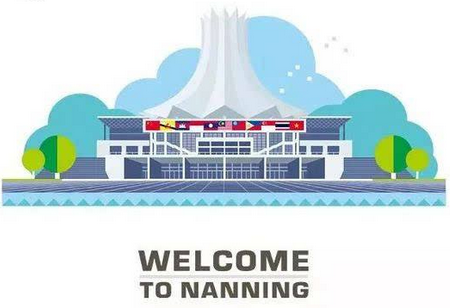Nanning, known as Yong for short and alternatively known as the Green City or the Yong City, is the capital of the Guangxi Zhuang Autonomous Region in Southern China, and acts as the core of Beibu Gulf City Cluster and the central city of the Beibu Gulf Economic Zone approved by the State Council. The city is a comprehensive transportation hinge accessible to the sea passage in Southwest China. Up to 2018, the city has a permanent population of 7.2541 million with an urban population of 4.5261 million (62.4%), on an area of 22,112 km2 with the built-up area totaling 372 km².
Nanning, located in the south of Guangxi, South China, is where the economic circle of South China, Southwest China, and Southeast Asia meet each other, and serves as the junction of regional cooperation in Pan-Beibu Gulf Economic Cooperation, The Greater Mekong Sub-region Economic Cooperation and the Pan-Pearl River Delta. Also, as a China's leading city open to ASEAN, it is the permanent site of the annual China-ASEAN Expo and functions as a key portal city to secure the tie with countries along the B&R Route. In addition, Nanning is the seat where the ground force headquarters of the Southern Theater Command is located.
Once as part of the Baiyue ethnic groups, Nanning has a history of more than 1,700 years. In the first year of Daxing period of the Eastern Jin Dynasty (318 AD), Jinxing County was established here as the seat of county government, thus registering the Nanning organizational system. In the reign of Zhenguan of the Tang Dynasty (632 AD), it was renamed Yongzhou as the seat of the government involved, which is how Yong, the abbreviation of Nanning came. In the first year of Taiding period of the Yuan Dynasty (1324 AD), it was further named Nanning Lu, literally meaning may peace maintain in the southern frontier, which is why Nanning was named. Remoteness with the rich culture has well found its way to the modern times here in Nanning with the dominant number of the Zhuang ethnicity but staying with others in a harmonious way.
Nanning was designated as a core city offering access to the ASEAN with supportive efforts to build it into an mega-city and international border city, according to the Development Plan of Beibu Gulf City Cluster released by the State Council in January 2017. The city was selected in November 2018 as part of the China Top 100 Cities in terms of overall Well-off index, and was reconfirmed to be the National Hygienic City (District) in the same year. It is in Guangxi that the Third China Youth Games will be held in 2023 when Nanning is planned to be the dominant city to host going hand in hand with its coordinates.







